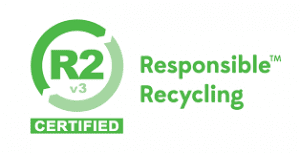The Responsible Recycling (R2) Standard includes all common processes, safety measures, and documentation needed for businesses that repair used electronics.
PCs for People is NAID AAA and R2 Certified. We follow the highest standards of data destruction and process audits and implement electronics recycling services. Every component that we don’t reuse is recycled responsibly.
Learn why it’s important to partner with R2 standard-compliant companies.
What Is R2 Certification, and Why Is it Important?
An R2 Certified recycling company is guaranteed to reuse donated tech devices responsibly and perform due diligence in the process of refurbishing donated electronics.
When you partner with a certified electronics recycler like PCs for People, your devices will be data-sanitized and refurbished in compliance with our zero-landfill policy.
Our Zero Landfill Protocol Reduces e-Waste
All quality electronic materials that are improperly disposed of can lead to serious environmental harm.
Most donated equipment ends up contaminating landfills. Despite tech organizations having good intentions with managing the used electronics in the industry, not all follow the health and safety practices requested by the certifying bodies for data security.
Responsible recycling can be challenging for a tech business or organization. There are hazardous chemicals, sensitive information in the devices, and possible risks to worker health in the tech recycling industry.
Dangers of the Electronics Recycling Industry
The standard clarifies the proper disposal of focus materials by electronic recyclers, also known as FMs. These components obtained from old electronics could pose a hazard to worker health if they aren’t handled properly.
There’s also the issue of data security from used electronics, which, if done improperly, could harm customers and compromise their safety. To increase efficiency, it’s safer to outsource and partner with a specialized R2 Certified organization like PCs for People.
Where Can I Find a Responsible Recycling Nonprofit?

Sustainable Electronics Recycling International (SERI) is the primary organization seeking compliance with the R2 Standard. Other entities promote environmental responsibility through the implementation of the R2 Standard.
R2 Certified facilities are audited independently, with SERI having its process for approving the certifications. They are in charge of certifying the Certification Bodies, who are responsible for certifying the facilities.
SERI doesn’t have a role in approving facility-level decisions to preserve objectivity and integrity.
Find an R2 Certified facility using this locator.
R2 Increases Credibility for Nonprofits
R2 Certification sets apart green facilities around the world, opening the door to business opportunities and increasing their credibility.
This certification came into existence after studies found that sensitive customer and business data remained on recycled electronics, even after passing through internal data disposal protocols.
R2 provides guidance through the “what, how, and who” choices of sustainable management and reuse of electronics. It’s designed to allow flexibility for companies looking to help the environment without sacrificing their businesses’ commitments.
Partner With an R2 Standard Recycling Certified Recycler
PCs for People follows the e-stewards protocol for environmental compliance. The e-stewards protocol guarantees that all components are carefully disposed of, considering their environmental consequences.
The e-stewards Initiative is a standard created by the Basel Action Network out of concern that e-waste generated in wealthy countries negatively impacts lower-income countries. Underage workers were dismantling used electronics without concern for their environmental impact.
Required Certifications for Electronics Recyclers

The certification requires most companies to document the processes and procedures at their recycling facility, submit a report on their implementation equipment, and provide updated statistics regarding their environmental impact.
The R2 Standard also requires certification from an approved Environmental, Health, and Safety Management System as its foundation for the company’s best practices for electronics repair services.
This is because the R2 Standard uses this system as a requirement for specific procedures for reusing and recycling electronic materials.
Facilities Take a Long Time To Get Certified
Most companies take 8 to 12 months to implement the international R2 Certification.
The latest version of the standard, version 3, and its requirements was released in 2020. Usually, companies require an ISO certification and corresponding audit to obtain the newest version of the standard.
R2V3 Preserves Customer Standards for Electronics
The updated list was developed by a community of recycling stakeholders and consultant companies and established responsible practices and requirements for electronics recyclers.
R2v3 emphasizes security controls and has requirements promoting protection from poor quality materials flowing from downstream vendors.
Customers often request certification from potential partners as a necessary cost of entry to satisfy their sustainability requirements. Currently, R2v3 continues to be the standard for electronics reuse worldwide.
Reuse & Recycle Efficiently Through the R2 Standard Certification
Lower your company’s environmental impact by partnering with an electronics recycling nonprofit in compliance with the R2 Certification.
PCs for People in St. Paul and Denver are R2 Certified nonprofits. While only those locations have the official certification, all our recycling processes follow all of the standard’s rigorous guidelines to reduce e-waste from your donated equipment.
Learn more about PCs for People’s e-waste pickup program here.



